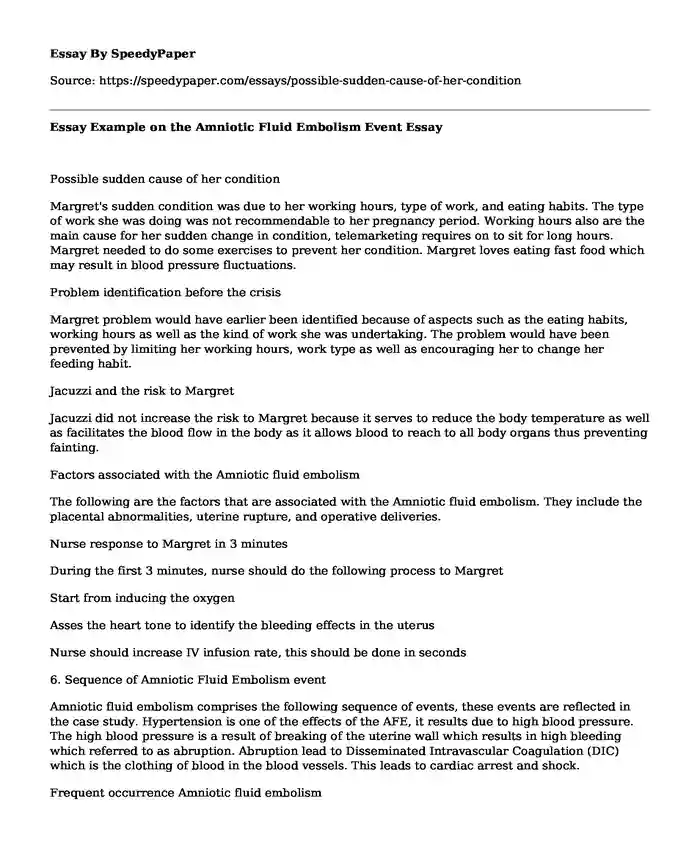
| Type of paper: | Essay |
| Categories: | Health and Social Care Nursing Pregnancy |
| Pages: | 4 |
| Wordcount: | 840 words |
Possible sudden cause of her condition
Margret's sudden condition was due to her working hours, type of work, and eating habits. The type of work she was doing was not recommendable to her pregnancy period. Working hours also are the main cause for her sudden change in condition, telemarketing requires on to sit for long hours. Margret needed to do some exercises to prevent her condition. Margret loves eating fast food which may result in blood pressure fluctuations.
Problem identification before the crisis
Margret problem would have earlier been identified because of aspects such as the eating habits, working hours as well as the kind of work she was undertaking. The problem would have been prevented by limiting her working hours, work type as well as encouraging her to change her feeding habit.
Jacuzzi and the risk to Margret
Jacuzzi did not increase the risk to Margret because it serves to reduce the body temperature as well as facilitates the blood flow in the body as it allows blood to reach to all body organs thus preventing fainting.
Factors associated with the Amniotic fluid embolism
The following are the factors that are associated with the Amniotic fluid embolism. They include the placental abnormalities, uterine rupture, and operative deliveries.
Nurse response to Margret in 3 minutes
During the first 3 minutes, nurse should do the following process to Margret
Start from inducing the oxygen
Asses the heart tone to identify the bleeding effects in the uterus
Nurse should increase IV infusion rate, this should be done in seconds
6. Sequence of Amniotic Fluid Embolism event
Amniotic fluid embolism comprises the following sequence of events, these events are reflected in the case study. Hypertension is one of the effects of the AFE, it results due to high blood pressure. The high blood pressure is a result of breaking of the uterine wall which results in high bleeding which referred to as abruption. Abruption lead to Disseminated Intravascular Coagulation (DIC) which is the clothing of blood in the blood vessels. This leads to cardiac arrest and shock.
Frequent occurrence Amniotic fluid embolism
The Amniotic fluid embolism occurs in different phases. The first phase is characterized the rapid respiratory failures and the cardiac arrest, in this, most of the fatalities occur from the Amniotic fluid embolism (Pacheco, 2016). The case study reveals the complication in Margrets pregnancy where she develops the failures in respiratory and the rapid cardiac arrest which later took her dear life.
The second phase of Amniotic fluid embolism is known as the hemorrhagic phase, this the phase where the mother starts to bleed profusely at the wound site where the cesarean operations occurred. One of the fatalities in this phase is coagulation which originates from the consumptive coagulopathy (Pacheco, 2016).
Test a physician will order to be done by a nurse
The physician should order a nurse to perform the following test (Bidet, 2016).
A blood test which comprises examining the clothing tissues, heart enzymes, electrolytes, blood type as well as the complete blood count (CBC).
The nurse should test on the Electrocardiogram (ECG) to evaluate on the heart rhythm.
Pulse oximetry should also be done in order to evaluate the amount of oxygen in the blood.
Echocardiography test should be done to evaluate the heart functions
According to the Margret case, the physician and nurses should have played a vital role to save her life by conducting the above test when the complications were detected and immediately during labor commencement (Bidet, 2016).
Steps of Neonatal Resuscitation
The following are the steps Neonatal Resuscitation which should be done immediately when the baby is born to prevent death (Rosen, 2015).
Provide warmth, clear airway if necessary
This is the step that involves providing the baby with the normal and stable temperature.
Ventilation
This is a step that should be followed to prevent the injuries which may occur to lungs to due to inflation of oxygen.
Chest compressions
The progression is followed to assess the heart rate of an infant which ought to be 60 every minute. The 2 thumbencircling hands technique is utilized in this step.
Administration of epinephrine
Medication should be provided to allow the baby to have the recommended ventilation which will facilitate is health during its infancy period.
Difference between the maternity cares
Margret was transferred to a better maternity care institution because of her conditions which kept becoming worse. She was transferred to a better health care center in order to get appropriate health care facilities which could help in stabilizing her worsening conditions. This compared to her earlier maternity care.
References
Bidet, E. A. (2016). An Order Protocol for Respiratory Distress/Acute Pain Crisis in Pediatric Palliative Care Patients: Medical and Nursing Staff Perceptions. Journal of palliative medicine.
Maurer, M. a. (2016). Understanding Consumer Perceptions and Awareness of HospitalBased Maternity Care Quality Measures. Health services research.
Pacheco, L. (2016). Amniotic fluid embolism: diagnosis and management. American Journal of Obstetrics and Gynecology.
Rosen, O. L. (2015). Simulation as a tool for improving acquisition of neonatal resuscitation skills for obstetric residents. The Journal of Maternal-Fetal & Neonatal Medicine, 1-5.
Cite this page
Essay Example on the Amniotic Fluid Embolism Event. (2019, Oct 04). Retrieved from https://speedypaper.com/essays/possible-sudden-cause-of-her-condition
Request Removal
If you are the original author of this essay and no longer wish to have it published on the SpeedyPaper website, please click below to request its removal:
- Essay Sample on Skepticism in Early Modern Europe
- Electoral College Essay Samples
- Literary Essay Sample: The Relationship in Frankenstein
- Criminal Homicide Essay Example
- Reflection Essay Example: The Tale of Sinuhe
- The American Promise: A History of the United States to 1877. Paper Example
- Free Essay Example: The BSN Essentials
Popular categories




